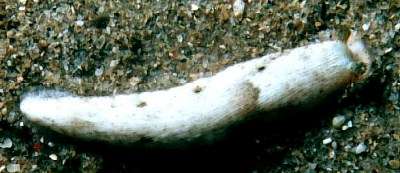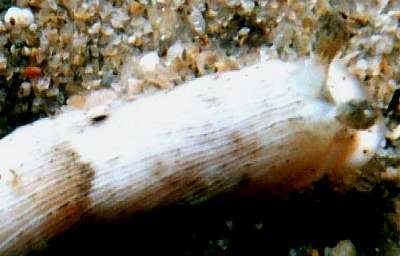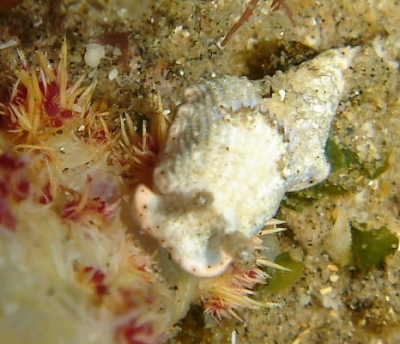

Dermatobranchus cf. semistriatus
Order: NUDIBRANCHIA
Suborder: ARMININA
Family: Arminidae
PHOTO
South Coast KwaZulu-Natal, SOUTH AFRICA. Shelly Beach (near Port Shepstone) - 32m, 5 March 2000. Size: 20mm. PHOTO: Valda Fraser.
Very similar to Dermatobranchus semistriatus Baba, 1949, described from Japan, but that species lacks the black crescentic mark halfway down the mantle. See message below.
Authorship detailsRudman, W.B., 2000 (March 12) Dermatobranchus cf. semistriatus [In] Sea Slug Forum. Australian Museum, Sydney. Available from http://www.seaslugforum.net/find/dermcfsemi
Related messages
Dermatobranchus feeding on soft coral
July 5, 2007
From: Colin Ogden

Hi Bill,
On a dive recently I had what I think is a Dermatobranchus cf semistriatus feeding on a soft thistle coral.
Locality: Sodwana Bay, 20 metres, South Africa, Indian, 27 Feb 2007, Reef. Length: 20mm. Photographer: Colin Ogden.
regards
Colin
scubaco@iafrica.com
Ogden C. M., 2007 (Jul 5) Dermatobranchus feeding on soft coral. [Message in] Sea Slug Forum. Australian Museum, Sydney. Available from http://www.seaslugforum.net/find/19594Dear Colin,
It's always good to get feeding records, even if the identity of the slug is still doubtful.
Best wishes,
Bill Rudman
Dermatobranchus from South Africa
March 13, 2000
From: Valda Fraser


Dear Bill
I definitely need a lesson or two on taking photos of pale animals! I just hope you can see enough to identify this one. Choose the image which is clearer (I used two different sized framers).
Locality: South Coast KwaZulu-Natal, SOUTH AFRICA. Shelly Beach (near Port Shepstone) - 32m
Date: 5 March 2000
Size: 20mm
Regards
Valda Fraser
iti04937@mweb.co.za
Fraser, V., 2000 (Mar 13) Dermatobranchus from South Africa. [Message in] Sea Slug Forum. Australian Museum, Sydney. Available from http://www.seaslugforum.net/find/2055Dear Valda,
I have used a bit of both so the general shape and colour pattern is clear. I am nor sure how you are judging exposure, but if it is an automatic metering system the problem is the meter is averaging across the pale object and the dark background. Perhaps try underexposing half an aperture if you can and see what happens.
Now to the animal. It is a species of Dermatobranchus and we are a long way from having those sorted out. It could possibly be D. semistriatus Baba, 1949 but that species does not have the blackish crescent halfway down the back. However we have liitle information on the variability of D. semistriatus so it is possible the crescent mark can sometimes be absent.
So at present Dermatobranchus cf. semistriatus would be the most appropriate name.
Best wishes,
Bill Rudman.
